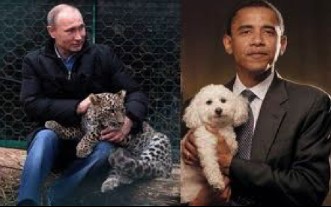 hysicists talk about dark matter and Planck time at the heart of the universe.
But I suspect at the very smallest scale it's not matter and energy, not mathematics,
but irony that makes up the substance of the universe.
hysicists talk about dark matter and Planck time at the heart of the universe.
But I suspect at the very smallest scale it's not matter and energy, not mathematics,
but irony that makes up the substance of the universe.
This certainly explains our current administration. To fully understand its mad policies requires a brand new conspiracy theory. I've put over thirty minutes into this, and I think I've found one: Barack Obama's fiendishly clever strategy is to demonstrate once and for all that leftism, if it should ever gain power in an important country, would be a catastrophe.
That America withdrawing from the Middle East would set it aflame is obvious to everyone now. His hands-off policy in Europe is deliberately designed to force them to start defending themselves—something eight years of nagging by his predecessor failed to accomplish.
France's politics are easy to predict: they simply observe what is happening in America and do the opposite. So Obama's strategy doesn't work in France. But in the rest of the world, where things are done more or less rationally, it's working beautifully.

Photo of Putin and Obama tweeted by Russian Deputy Prime Minister Dmitry Rogozin
Last July Russian Deputy Prime Minister Dmitry Rogozin released a photo of Putin and Obama, with Vladimir holding a leopard and Barack holding a poodle with a photoshoppily missing left front leg. The caption was “We have different values and allies.” This too is part of Obama's diabolically clever strategy with Russia, starting with our State Department's button labeled перегрузка (peregruzka), which unbeknownst to the geniuses in Washington actually means ‘overload’ or ‘congestion’, not ‘reset.’
At least, that's what they want you to think. The real plan is to let Putin think that America is weak, indecisive and spectacularly incompetent, and then—bang!—our president gets replaced by one who knows what he's doing and—falling right into our trap—Putin is screwed.
In retrospect, it seems clear that what was written on that button was no mistake. His policy really is overload and congestion, not reset. An important component of the strategy of overload and congestion is conspicuous detachment: when he's not playing golf, Obama passes the long hours in the White House by tossing a fake football around to his staffers and taking selfies. It's all carefully choreographed to trick our enemies into thinking American leadership is in a tailspin by putting American leadership into a tailspin.
Jimmy Carter was a master at this strategy: he pretended to be hopelessly naïve and incompetent. The carefully staged “killer rabbit” affair was merely a clever gambit. His feckless attempts to rescue the Iranian hostages were but a ploy to make the Iranians overconfident. Carter's masterful plan to release the hostages by being a total goof and thereby getting himself replaced by Ronald Reagan worked like a charm.
When Obama pulled our troops out of Iraq, few recognized the genius of his strategy: pretend to surrender our hard-won peace, let the terrorists come out of the shadows, and when they're off guard, pounce. It might have worked if he hadn't forgotten that last part.
Karl Marx said history repeats itself, first as tragedy, second as farce. These days, the farce comes first and the tragedy second. Obama, subtly reminding us of Bill Clinton, said the arc of the moral universe may bend toward justice, but it doesn't bend on its own. Maybe he really believed he could bend the moral arc of the universe. But narcissism has an arc too: the geodesic of moral narcissism has one end in the White House, and the other in megalomania. Narcissism is more like a Möbius strip: when followed to its end, it turns into its opposite.
My theory is that the whole fabric of history is made of irony, and irony is curved. Sure there may be a few holes in it—okay, a lot of holes—but it's my theory, and I'm sticking to it.
